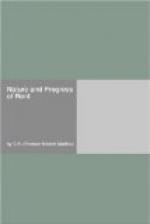The earth has been sometimes compared to a vast machine, presented by nature to man for the production of food and raw materials; but, to make the resemblance more just, as far as they admit of comparison, we should consider the soil as a present to man of a great number of machines, all susceptible of continued improvement by the application of capital to them, but yet of very different original qualities and powers.
This great inequality in the powers of the machinery employed in procuring raw produce, forms one of the most remarkable features which distinguishes the machinery of the land from the machinery employed in manufactures.
When a machine in manufactures is invented, which will produce more finished work with less labour and capital than before, if there be no patent, or as soon as the patent is over, a sufficient number of such machines may be made to supply the whole demand, and to supersede entirely the use of all the old machinery. The natural consequence is, that the price is reduced to the price of production from the best machinery, and if the price were to be depressed lower, the whole of the commodity would be withdrawn from the market.
The machines which produce corn and raw materials on the contrary, are the gifts of nature, not the works of man; and we find, by experience, that these gifts have very different qualities and powers. The most fertile lands of a country, those which, like the best machinery in manufactures, yield the greatest products with the least labour and capital, are never found sufficient to supply the effective demand of an increasing population. The price of raw produce, therefore, naturally rises till it becomes sufficiently high to pay the cost of raising it with inferior machines, and by a more expensive process; and, as there cannot be two prices for corn of the same quality, all the other machines, the working of which requires less capital compared with the produce, must yield rents in proportion to their goodness.
Every extensive country may thus be considered as possessing a gradation of machines for the production of corn and raw materials, including in this gradation not only all the various qualities of poor land, of which every large territory has generally an abundance, but the inferior machinery which may be said to be employed when good land is further and further forced for additional produce. As the price of raw produce continues to rise, these inferior machines are successively called into action; and, as the price of raw produce continues to fall, they are successively thrown out of action. The illustration here used serves to show at once the necessity of the actual price of corn to the actual produce, and the different effect which would attend a great reduction in the price of any particular manufacture, and a great reduction in the price of raw produce.
I hope to be excused for dwelling a little, and presenting to the reader in various forms the doctrine, that corn in reference to the quantity actually produced is sold at its necessary price like manufactures, because I consider it as a truth of the highest importance, which has been entirely overlooked by the Economists, by Adam Smith, and all those writers who have represented raw produce as selling always at a monopoly price.




